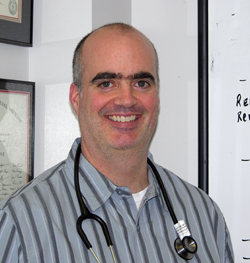 |
Ted Mikuls, M.D. |
NOTE: This profile is part of a series highlighting the 26 researchers who were named UNMC Distinguished Scientists or New Investigators for 2007. Each of these researchers will be profiled in UNMC Today leading up to a March 20 ceremony to recognize their achievements.
- Name: Ted Mikuls, M.D.
- Title: Associate professor
- Joined UNMC: 2002
- Hometown: Omaha (Dr. Mikuls grew up in Red Oak, Iowa)
Briefly describe your research in laymen terms.
My research is focused on examining genetic and environmental associations with the onset and course of rheumatoid arthritis (RA).
What led you to pursue this area of research?
My interest in RA really started as a resident at UNMC thanks to the influence of my mentor Dr. Jim O’Dell (a 2007 Distinguished Scientist). I received formal training in epidemiology and clinical research during my fellowship and got involved in a large epidemiological cohort (Iowa Women’s Health Study) that was examining risk factors for RA onset in older women. This led to several publications and grant applications and active collaborations that are still important.
How do you see your research contributing to science?
Clearly, understanding more about factors that influence disease risk and disease expression will be vital to effective prevention and treatment of chronic diseases such as RA.
Why did you become a scientist?
I liked the idea of bridging the day-to-day activities of a practicing clinician with investigative research and teaching. Every day is different, every day brings new challanges, and I get to play the “perpetual student.”
What is your hope for the next generation of scientists?
My hope would be that we continue to value investigative research as a society and that appropriate resources continue to be available for novel investigators initiated research. Moreover, increasing the emphasis on translational research — particularly translating clinical trial findings into community practice — will be essential if we are going to overcome health disparities in health care and optimize health care in general.
Beyond grant funding, how do you measure success?
If I can continue to enjoy the day to day work, contributing to the overall environment at UNMC, and balance it all with the things that are actually important in life — like my family — then I will have felt successful.
What would you tell a student interested in a research career?
One, it’s a great gig. Two, research opportunities rarely fall in your lap — early successes are directly proportional to the trainee’s initiative. Three, second to initiative and interest, having a mentor committed to your development is key. Four, set realistic goals for a project — the goal of early projects should be focused on learning and developing specific research skills, not publication in major journals.
Do you have a hero/role model? If so, what do you admire most
about this person?
My role models have clearly been those that have taken lead roles as research mentors and collaborators, people who have been very generous and at the same time lots of fun to work with. Dr. O’Dell and other members of the rheumatology section here, Dr. Ken Saag at the University of Alabama-Birmingham and Dr. Lindsey Criswell at the University of California, San Francisco are examples of these type of people.
Tell us about your family and hobbies outside of the lab.
My wife Michelle met while I was a student here at UNMC. I have two kids, Jared, 10, and Andrea, 8. We like to travel and I spend a lot of time dabbling in photography and writing.